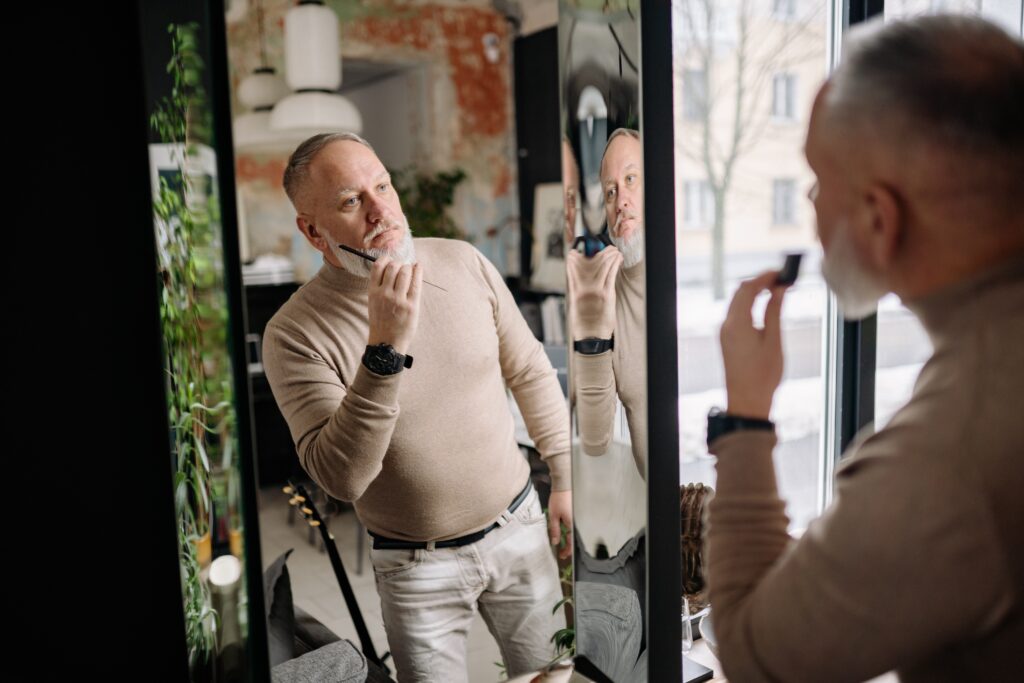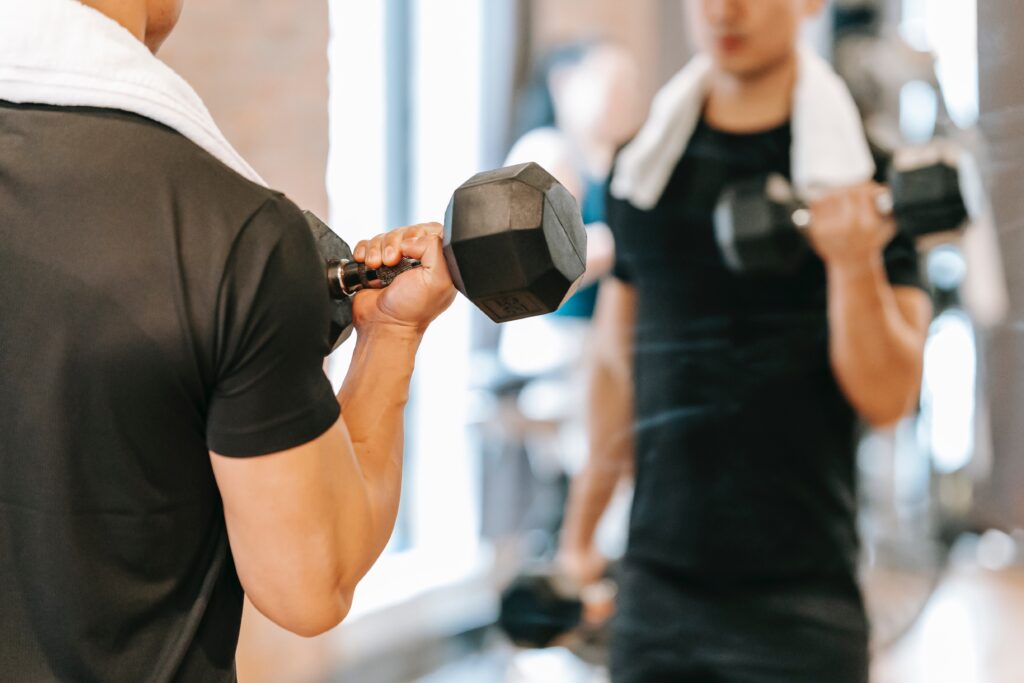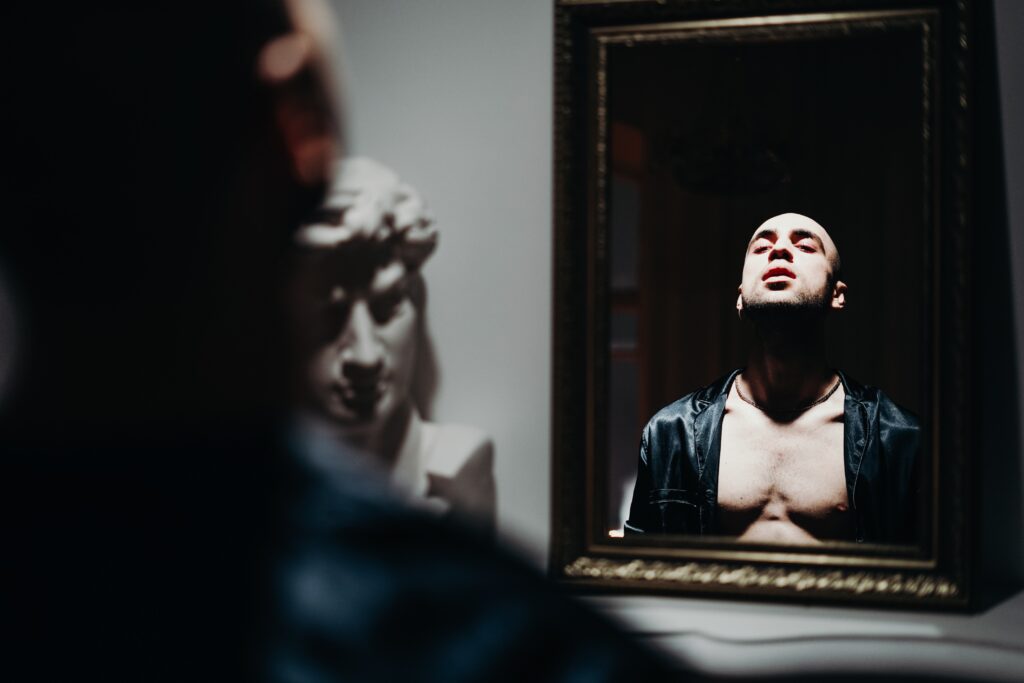My hot take on the gay male beauty myth
This morning started out not much different from the other days of my adult life. I woke up, greeted my dog, grabbed coffee, and went into the bathroom to brush my teeth. As usual, I bent over in front of the mirror, not for a better brushing angle, but so I wouldn’t have to see the reflection of my fat, naked stomach staring back at me.
Later, once I’d showered and put my clothes on, I felt the bulge over my pants, grabbed it on the front and sides, and tried to figure out if my stomach was bigger or smaller than the day before. That’s another ritual I practice every day—actually, several times a day. If you count how often I examine my stomach in the gym mirrors while I’m working out, it’s practically an exercise all by itself.
That song “Victoria’s Secret” came on the car radio when I went upstate a couple of weeks back, and, as always when I hear such tunes, I felt terrible for all the women in the world who suffer from body dysmorphia and every horrible thing that goes with it. What I forgot, and what shouldn’t have escaped me, since I’d been plagued all weekend over the fact that I’d had to buy new, larger pants to wear to the wedding I’d attended, was how much so much of my time on this earth has revolved around being dissatisfied with my body, despite what selfies and Instagram thirst traps and hookups and dates and sexy boyfriends would seem to negate. Or, if you do a little research, such exploits might back up.
What’s almost funny is how many times I’ve thought that if I only lost five pounds then my body would be perfectly acceptable, “great” even. Yet, somehow, over weight fluctuations and muscle ups and downs and men who’ve told me I looked fantastic as is, that five-pound loss has never been achieved. But if it did happen…nirvana.
Precise statistics for Body Dysmorphic Disorder (BDD) among gay men are hard to pin down, but studies have shown that, while gay men comprise roughly 4 percent of the U.S. population, they represent 12.5 percent of men with BDD. Further, among men who have eating disorders, 42 percent identify as gay, and gay men are far more likely to suffer from self-esteem issues in regards to their bodies than straight men.
But, at 58, shouldn’t I be over it already? And with so much information and support out there, shouldn’t we all?

I’m so used to being uncomfortable with my body that, in all my years writing for queer publications, it never occurred to me until recently that it’s something I might want to discuss. I’ve given my hairy chest more airtime (I have a love/hate relationship with this furry existence). Like so many of us, I take it in stride that I’m forever dieting, cutting out sugar, amping up those workouts, nixing carbs, and repeating phrases like “keep me away from that bread,” “I’m obese,” “I must have gained ten pounds today,” “do not let me take another bite,” “no candy for me,” and just plain old “call me fatty.” My words in regards to body weight (which I share with virtually all of my women friends) are practically a second language, one that I’ve been speaking flawlessly since the age of ten.
Almost every time I talk to my sister on the phone, we discuss our fat levels within five minutes of the conversation. And we don’t find that odd.
I started as a fat kid, literally, almost nine pounds at birth, with nowhere to go but outward. By the time I hit grade school, I was shopping in the Husky section at J.C. Penny’s, which, if you’ve ever suffered such humiliation—for girls it was “Chubette”—know what damage it, and the name-calling that comes with it, does to your psyche. According to the other kids in school, and the kids I saw on TV and in movies, I wasn’t normal, and I dreamed of looking like the athletic boys whose bellies didn’t pop out and who conquered the day just by fitting into it. Plus, my little horned-up self was attracted to those guys and those guys only.
The summer before intermediate school, not knowing anything about safety and dieting, I practically starved myself and lost those extra pounds. (I remember having a bowl of Grape Nuts for breakfast, then a plain yogurt for dinner.) I also started jogging around the block; one, two, eventually three times. My family, a circus of confusion with a single mom and four siblings and little money, didn’t notice that I was skipping meals.
While the diet and exercise helped, it would be another 15 years before I could look at my body without shame. That was in my 20s, in New York, when I started working out seven days a week, two hours at a time. I had a 28-inch waist and muscles and couldn’t have been more thrilled with myself—I had a habit of forgetting to wear shirts. I did a play when I was 29 and a fellow cast member confided to me after the show one night that she was concerned about how thin I was, because the part called for so much stamina and I looked like I might faint. That was the best compliment I’d received in years.

But It didn’t last.
My metabolism slowed down around the age of 31, and since then, 27 years of time, I’ve not had a single day where I truly loved my body. Others have—I’ve been lucky in the men department—and, in a sane world, I would think their appreciation of my form would be enough for me to celebrate as well. Shake your heads “no” along with me if you know what it also feels like for a boy.
Generally, when men tell me I have a beautiful body I think they’re lying. I believe them when they say I have a handsome face and a nice smile and a pretty dick. It’s everything that holds those parts together that’s in disrepair. I sleep with a shirt on because I can’t see the extra weight, even in the middle of the night when no one’s looking at me. Because even in the middle of the night everyone’s looking at me. I have “photo approval” of every picture friends take, and once stole a pic a friend took of me and hung on his wall. It was of the two of us, but I looked fat and he looked great and I knew others would probably see it when they stopped by. He didn’t speak to me for about a year after he found out I’d committed the theft.
But this summer was the clincher. In June I developed Covid, and lost everything but my appetite. Not only did I miss the gym for a couple of weeks (unheard of), but I ate junk food to boost my spirits. The Covid dissipated but the fatigue did not, and gym workouts were sparse and unsatisfying. I traveled a lot and ate too much unhealthy food and before I realized what had hit me (literally), I’d gained ten pounds and gone up a waist size, and not a stitch of my old good clothes (i.e. anything that wasn’t sweats or gym-shorts-related) fit me without extreme discomfort. The Husky section had entered my bedroom, and I was still trying to dress like I was getting ready to walk the runway. It’s been self-humiliation on a daily basis.
Most people I know go up and down in weight throughout their lives, for a multitude of reasons, and, when I do the math, I find it astounding that, since my mid-20s, I’ve always been in good shape, if not Adonis-worthy. In all that time I’ve never gone a whole month without hitting a gym (I home-gymmed it during lockdown), and the thought of being heavy again—actually heavy—terrifies me. The fact that I gain weight easily if I don’t do cardio makes the prospect far more probable as I approach David 6.0. Despite the flaws I dwell on, and despite the fact that I’m sick of gyms (I mean, over them like I’m over hearing about The Former Guy and the latest Kanye West insanity), I’ve relied on this shell to make an impression, be affirmed, get laid, feel complete. I need the fix.
At the same time, I’ve had the best and most fulfilling sex life starting at the age of 50, and I’ve gotten a bit thicker with each spin around the sun. Let’s do the “SMH” emoji together. Kids, If you haven’t figured it out yet, it’s a sickness.
I’d like to change my behavior, end my addiction, so to speak, but I’m not quite sure how. Every time I see a man on the street with a super-thin waist—I’m now a (gasp!) 33—I regret whatever I ate that day and become determined to work out harder. I also get jealous. It doesn’t matter if he’s 23 or, as is often the case, wishing he could gain weight (that’s an affliction many of my thin, gay men share), I crave his figure the way an addict craves opioids. I haven’t, however, taken steroids or supplements other than protein powder or gotten lipo-suction or fat freezes or whatever they’re doing now to look thin and beautiful. Luckily, I’m terrified of unnecessary surgery or anything artificial being put inside of me.
I just want peace of mind and body.
In between finishing up this piece I hit the gym and ran into a trainer I’d once hired. He looked me up and down then asked if I was doing steroids.
“No. Why?” I asked.
“Because you look amazing.”
I’ll savor that high until the next rejection, internal or otherwise.






